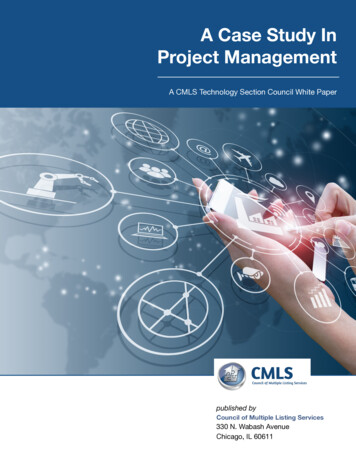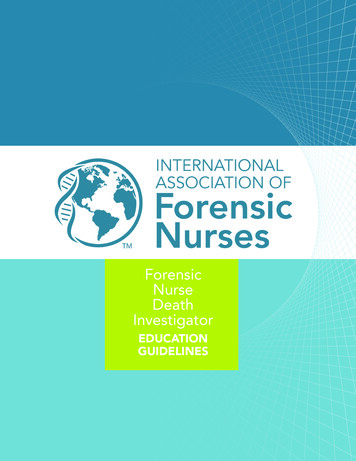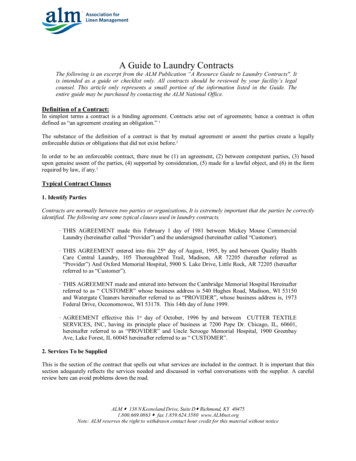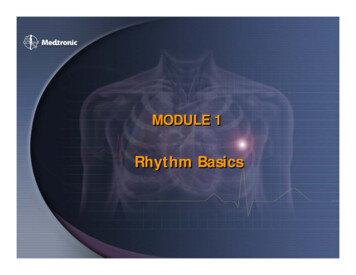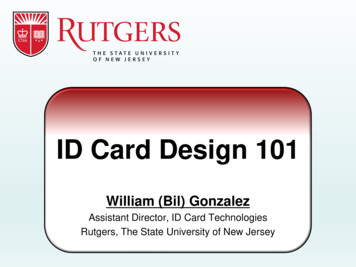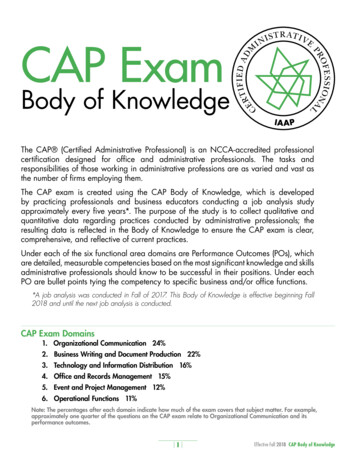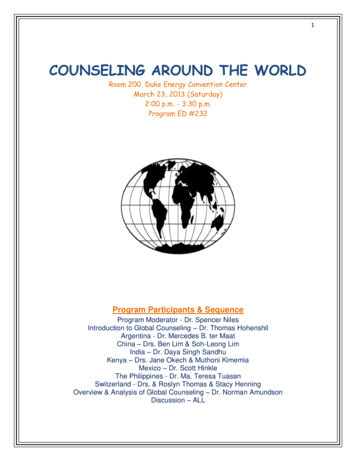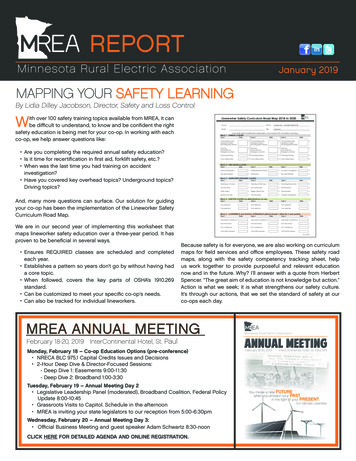
Transcription
REPORTJanuary 2019MAPPING YOUR SAFETY LEARNINGBy Lidia Dilley Jacobson, Director, Safety and Loss ControlWith over 100 safety training topics available from MREA, it canbe difficult to understand, to know and be confident the rightsafety education is being met for your co-op. In working with eachco-op, we help answer questions like:Lineworker Safety Curriculum Road Map 2018 to 2020Master List – updated 08/24/18TitleLinemanLineworker Safety Certification designation to be earned with completion (pending)Year 1DateYear 2DateYear 3DateAnnual Safety SuiteHazardous WasteFire Extinguisher ReviewRAnnual Safety SuiteHazardous WasteFire Extinguisher ReviewRAnnual Safety SuiteHazardous WasteFire Extinguisher ReviewRPole TopBucket RescueEmergency ActionsRPole TopBucket RescueEmergency ActionsRPole TopBucket RescueEmergency ActionsRSwitching TrainingRSwitching TrainingRSwitching TrainingRCrew ObservationRCrew ObservationRCrew ObservationBlock 2 – TIME-BASED CLASSESYear 1DateYear 2DateYear 3Hazard RecognitionHForklift/Skid Steer SafetyDAccident InvestigationFirst Aid/CPR/AEDRPPE ReviewFFirst Aid/CPR/AEDBlock 3 – LINEWORKER REQUIRED CLASSESYear 1And, many more questions can surface. Our solution for guidingyour co-op has been the implementation of the Lineworker SafetyCurriculum Road Map. Ensures REQUIRED classes are scheduled and completedeach year. Establishes a pattern so years don’t go by without having hada core topic. When followed, covers the key parts of OSHA’s 1910.269standard. Can be customized to meet your specific co-op's needs. Can also be tracked for individual lineworkers.NameEmailBlock 1 - ANNUAL CLASSES Are you completing the required annual safety education? Is it time for recertification in first aid, forklift safety, etc.? When was the last time you had training on accidentinvestigation? Have you covered key overhead topics? Underground topics?Driving topics?We are in our second year of implementing this worksheet thatmaps lineworker safety education over a three-year period. It hasproven to be beneficial in several ways.Co-opDateYear 2DateYear 3RDateGRDateWorking on OH LinesAWorking on URD LinesBTrenching/ExcavationBHot Line WorkXOH TransformersAFall ProtectionATraffic SafetyDDigger Derrick OpsDDriving SafelyDBucket Truck OpsDTree TrimmingAVoltage TroubleshootBlock 4 – ELECTIVE CLASSES (as determined by Co-op)Year 1DateYear 2DateYear 3Your selectionYour selectionYour selectionYour selectionYour selectionYour selectionCDateBlock 5 – CONFERENCE and SCHOOL ATTENDANCE (attend at least 1 within the 3 year period)Year 1DateYear 2DateYear 3Lineworker ConferenceLineworker ConferenceLineworker ConferenceHot Line SchoolHot Line SchoolHot Line SchoolSLC ConferenceSLC ConferenceSLC Conference10-Hr OSHA General10-Hr OSHA Genera10-Hr OSHA GeneraDateRev. 111817Because safety is for everyone, we are also working on curriculummaps for field services and office employees. These safety roadmaps, along with the safety competency tracking sheet, helpus work together to provide purposeful and relevant educationnow and in the future. Why? I’ll answer with a quote from HerbertSpencer. “The great aim of education is not knowledge but action.”Action is what we seek; it is what strengthens our safety culture.It’s through our actions, that we set the standard of safety at ourco-ops each day.MREA ANNUAL MEETINGFebruary 18-20, 2019 InterContinental Hotel, St. PaulMonday, February 18 – Co-op Education Options (pre-conference) NRECA BLC 975.1 Capital Credits Issues and Decisions 2-Hour Deep Dive & Director-Focused Sessions:- Deep Dive 1: Easements 9:00-11:30- Deep Dive 2: Broadband 1:00-3:30Tuesday, February 19 – Annual Meeting Day 2 Legislative Leadership Panel (moderated), Broadband Coalition, Federal PolicyUpdate 8:00-10:45 Grassroots Visits to Capitol. Schedule in the afternoon MREA is inviting your state legislators to our reception from 5:00-6:30pmWednesday, February 20 – Annual Meeting Day 3: Official Business Meeting and guest speaker Adam Schwartz 8:30-noonCLICK HERE FOR DETAILED AGENDA AND ONLINE REGISTRATION.
WHAT IS REMA?By Melissa Stachovich, Director of Finance and AdministrationREMA stands for the Rural Electric Management Associationand was formed over 34 years ago to provide education andtraining for MREA members. Prior to 2012, REMA was a standaloneentity until the REMA CEO and MREA boards approved forREMA to become a subsidiary under MREA with the emphasisthat REMA would continue to operate as it has historically whilecarrying out the vision of MREA of preparing members for successin an evolving industry. REMA has five sections: CEOs, FinanceManagers, Member Services, Line Superintendents, and Engineersand Operations. Each section has an advisory committee made upof members from MREA’s seven districts. The advisory membershelp plan, guide and lead the eleven REMA events each year.REMA continues to operate with a separate dues structure fromMREA. Section dues for 2019 are 385. Paying dues for individualsections gives each cooperative member one registration at eachof the conferences for that section.CHRISTINE FOX NAMED ITASCA-MANTRAP CEOThe Itasca-Mantrap Cooperative Electrical Association Boardof Directors has hired Christine Fox as its new president andCEO. Fox's duties as CEO began January 7, 2019. She replacedMike Monsrud, who retired after 13 years with the cooperative.The board's national search resulted in a large number ofcandidates and an extensive round of interviews concludedthat Fox was the best person to lead the cooperative.Fox has served as chief financial officer at Itasca-Mantrapsince 2014. She holds a bachelor’s degree in accountingfrom St. Cloud State University, a master’s degree in businessadministration with a concentration in finance from the Universityof St. Thomas and is also a certified public accountant."I'm honored to have been selected as the next CEO of ItascaMantrap," said Christine Fox. "Having worked at Itasca-Mantrapthe past four years, I know the strength of a local cooperativeis that it works with other cooperatives nationwide to developnew technologies and infrastructure, learnsfrom each other and keeps the grid secure.I look forward to leading a communityfocused electric cooperative that worksefficiently to deliver affordable, reliable andsafe energy to our consumer members. Ifeel fortunate to live and work in such abeautiful community." Prior to joining ItascaMantrap, Fox held various managementpositions in the manufacturing field.Nancy Utke, Itasca-Mantrap board chair, stated, "We are veryfortunate to be in a position to promote Christine to CEO. She isexceedingly familiar with the financials of the cooperative, andwith her past management experience, she will hit the groundrunning. We look forward to working with Christine in her newrole and believe she will make a great CEO!"HAL HALPERN NAMED CEO & GENERALMANAGER OF COOPERATIVE LIGHT & POWERHal Halpern was named CEO and general manager ofCooperative Light & Power, Two Harbors, effective January7, 2019. Halpern previously was the chief strategic advisor atWestell, a provider of high-performance network infrastructure.Halpern was educated as a physicist at the City University ofNew York and grew up in a cooperative for 15 years. When hisfamily first moved into the cooperative there were fewer than100 families and the co-op membership grew to more than5,000 families.Hal was the CEO of Fiber-Span, a manufacturer of RF ONFIBER communication network products for in-building, in-tunnel, and outdoor coverage extensionsystems responsible for saving countlesslives. Hal was also CEO of LightguideCommunications where his team wasresponsible for over one million electricand broadband new builds and upgrades.Hal intends to apply his considerableexperience and innovation skills atCooperative Light & Power to help the cooperative consideroffering fast speed broadband, telecom, renewable energy andother innovative services.
REMEMBERING BOB BERGLANDBy Shari Wormwood, Communication SpecialistBob Bergland, an electric cooperative leader, passed awayat the age of 90 on December 9, 2018. His life is a pictureof devotion to the farmer and rural America. He served as U.S.Secretary of Agriculture, a Congressman, and NRECA ExecutiveVice President and General Manager from 1984 to 1994.Berglund saw the birth of Rural Electrification in 1935 and becamea front runner for Minnesota’s farm economy. After taking farmingcourses at the University of Minnesota and giving farming a try,he turned to carpentry work and then took an administrativeposition with the USDA. He eventually returned to farming despitethe stagnant agriculture climate at the time.1From 1971 to 1977 he served three terms in Congress servingMinnesota District 7 and is credited for shepherding the Farm Actof 1977 to passage.2When Jimmy Carter, a rural Georgian farmer, was elected in 1977he nominated Bergland as Secretary of the U.S. Department ofAgriculture. From there, he successfully led NRECA for 10 yearsbringing these programs we depend on today: The creation of Cooperative Benefit Administrators in 1984The National Rural Telecommunications Cooperative in 1986The National Economic Developers Association in 1989Homestead Funds in 1990Congressional adoption of the Rural Utilities Service,successor to the Rural Electrification Administration, in 1994.2While at NRECA, Bergland said, “The main objective is to take thelead in solving environmental problems by showing that electricityis an important part of the solution. A number of benefits will beseen for our industry, but one of the most important is that we willincrease the desirability of electricity for our consumers.”2In response to this quote published by NRECA in ElectricCooperative News, Jared Echternach, CEO of Beltrami ElectricCooperative said, “Bergland, was speaking 25 years ago aboutbeneficial electrification the very premise upon which we nowseek legislative reform. Mr. Bergland’s legacy will live on in thework we do today.”Bob Bergland stands near photos and other memorabilia from histime on the Carter administration at his home in Roseau.In his farewell address at NRECA’s 52nd Annual Meeting in NewOrleans in 1994, Bergland predicted the broadening mission ofelectric co-ops as “old-time REA champions retired,” but said themotivations of co-ops would remain “family, church, community,honesty, integrity, caring those are the things you do every dayand those are the reasons why I’ve enjoyed this job enormously.”2Bergland was inducted into the Cooperative Hall of Fame in 1994and received the Clyde Ellis Award, the highest honor bestowedon an individual by America’s electric cooperatives.2After retiring, he returned to his farmstead in Roseau, Minn. TracyStoll, Roseau Electric Cooperative said, “Mr. Bergland was alwaysconcerned with the rural cooperative member. In recent years, Mr.Bergland’s attendance at Roseau Electric Cooperative’s annualmeeting along with visits with management served to remind usof the value of the cooperative business model. His presence andinput will be ergland-usda-nreca-leader-dies-90/CO-OPS, STAKEHOLDERS JOIN FORCES ATELECTRIFY MINNESOTA EVENTBy Gary Connett, Beneficial Electrification LeagueIt was standing room only in a conference room at Great RiverEnergy’s Maple Grove office as nearly 100 people representingelectric cooperatives, environmental advocacy groups as well asvendors turned out to learn more about a topic they all have avested interest in: beneficial electrification.The event was sponsored by the Beneficial Electrification League– chaired by Gary Connett, who was formerly Great River Energy’sdirector of member services and marketing – and supportedby the National Rural Electric Cooperative Association, NaturalResources Defense Council, Minnesota Rural Electric Associationand Wisconsin Energy Conservation Corporation.Beneficial electrification is the application of electricity to enduses that would otherwise consume fossil fuels (think electric vs.gas vehicles) and satisfies at least one (continued on next page)
ELECTRIFY MINNESOTA EVENT (CONTINUED)Groups attending the event contend that electrifying parts of theeconomy is necessary to achieve carbon emissions reductiongoals worldwide. This is possible due to declining emissions fromelectricity generation as utilities, which continue to become moreefficient and incorporate more renewable sources of energy intotheir power supply portfolios.Ellen Anderson of the Minnesota Energy Storage Alliance speaks toattendees of the Electrify Minnesota eventof the following without adversely affecting the others: Saves consumers money over the long termBenefits the environmentReduces greenhouse gas emissionsImproves the overall efficiency of the gridThe meeting fostered conversation from panel participants suchas Connexus Energy CEO Greg Ridderbusch, Michael Noble ofFresh Energy and Ellen Anderson of the Minnesota Energy StorageAlliance about electrification opportunities in Minnesota. Anotherpanel discussion focused on the variety of residential, commercialand industrial beneficial electrification technologies that can meetthe needs of consumers and utilities.“Beneficial electrification can provide a number of benefits toour members and the state of Minnesota, and this event broughtmany thought leaders together to discuss how it can be effectivelyintegrated into our state energy policies,” said Jeff Haase, GreatRiver Energy leader, member technology and innovation.GRASSROOTS ACTIVITY AMONG YOUR 2019 RESOLUTIONS?By Darrick Moe, MREA President and CEO, Joyce Peppin, Director of Government Affairs and GeneralCounsel, Jenny Glumack, Manager of Legislative AffairsWhile taking down your Christmas tree and nailing down your2019 resolutions, we encourage you to think about how youcan help meet the legislative challenges the cooperative familywill be facing in the new year. The November elections resulted ina new majority in the Minnesota House of Representatives, whichmeans new leadership for that body. They haven’t decided on theirenergy priorities yet, but we’ve heard them express a desire forMinnesota to be a national leader in energy and environmentalpolicies. The Senate will be turbulent, with the majority holding onlya one vote advantage and members weighing positions as theycontemplate the 2020 elections.The new Chair of the Energy and Climate Finance and PolicyCommittee, Rep. Jean Wagenius, visited the MREA Board inDecember. This provided an opportunity to visit about whatis important to co-ops and our members. She noted it was tooearly to discuss specific bills, but made clear she will continueto prioritize energy policy that is responsive to her environmentalconcerns.The bipartisan nature of our issues and efforts is more importantthan ever. Thankfully, we have deep roots and good friends in bothparties. It promises to be a legislatives session that will requiresubstantial work across parties, and more importantly across ourmembership, to be as successful as possible. While MREA workshard at the legislature, the source of our strength lies in the unity ofeffort and engagement of our grassroots network across the state.We continue to work in partnership with the municipals on CIPreform legislation. We are seeking a path forward with as broad abase of support as possible, which is critical to the effort. Duringthe joint cooperative and municipal team meeting on Dec. 19, thegroup planned next steps in negotiating with stakeholders andin furthering developing bill language. We appreciate the timeand talents of the CEOs and G&T representatives continuing towork on this priority. While we remain committed to proposingmeaningful reforms, the likelihood of success is unclear.Get prepared and get started. Looking at news around the countryregarding higher renewable energy standards and other significantmeasures in the context of our legislative landscape raises alarm.If you have a new legislator, start building a relationship. If yourlegislator doesn’t know a lot about rural electric cooperatives, it isa good time for another visit. Think about how you can help – thecooperative family will need to be at the top of our game and fullyengaged.If you’d like assistance from MREA or have information to sharefrom meetings with legislators, please let us know.Considering using geothermalto heat and cool your home?TRUST YOUR COMFORTWITH AN EXPERT.visit: waterfurnace.comcall: (260) 442-5374
LEARN, DEVELOP AND CONNECTWITH MREA TRAINING AND EVENTS IN 2019Have you started circling, highlighting or better yet, registering for the MREA events you planto attend this year? While the latest events are always online, we also make it a priority,before the end of each year, to provide the membership with our calendar of events featuringour education and training programs.With 83 events and trainings plus seven trade shows, there’s something for every member. You’llsee plenty of what you’ve come to expect, MREA’s upcoming events include:-REMA conferencesLineworker conference, hotline schools and hands-on equipment trainingFour DG interconnection process trainingsEmployee networksA full slate of director trainingLeadership trainingWe continue to build in new and requested educational opportunities to adapt and preparemembers for the dynamic nature of our evolving industry. Here are some highlights:VEGETATION MANAGEMENT ROUNDTABLE: JANUARY 23 (BRAHAM)This newly added network group is for co-op employees only, specifically for forestry servicespersonnel and those responsible for vegetation management, including engineering, operationsand line superintendents.CLICK ME!LINEWORKER TRAINING CONFERENCE AND TRADE SHOW: JANUARY 23-25 (ALEXANDRIA)We’re at a new location, which will offer more of a conference feel with outdoor evening fun featuring snowmobiling and ice fishing. We’replanning an indoor equipment display at the trade show and a new “Tool Time” session on Friday morning, where vendors will safelydemonstrate unique tools.MREA LEGAL SEMINAR: JUNE 11 (MAPLE GROVE)Every other year we feature a legal seminar. This is an exclusive opportunity for electric cooperative attorneys or co-op staff to shareinformation and get an in-depth overview of hot topics and current challenges in the utility industry affecting Minnesota and nationwide.14TH ANNUAL BURN CENTER BENEFIT GOLF TOURNAMENT: JULY 26 (BECKER)Online registration is now open to golfers and/or sponsorships. Pass the word along for this wonderful cause.COMING UP THIS MONTH.DATESEMINARLOCATIONJanuary 16REMA Member Services pre-con: DG interconnection process trainingHilton Mpls/St. Paul Airport MOAJanuary 16-18REMA Member Services winter conference and trade showHilton Mpls/St. Paul Airport MOAJanuary 17DG interconnection process trainingBeltrami Electric Cooperative, Inc.January 18District 1 meetingBeltrami Electric Cooperative, Inc.January 22DG interconnection process trainingPeople's Energy CooperativeJanuary 22-24NRECA Board Leadership Certificate (BLC) summitCourtyard Marriott, Maple GroveJanuary 23Vegetation management roundtableEast Central EnergyJanuary 23-25Lineworker conference and trade showArrowwood Resort, AlexandriaJanuary 28-30Winter DC legislative visitWashington, D.C.January 30-31Leadership training: module 2Kandiyohi Power Cooperative
Homestead Funds in 1990 Congressional adoption of the Rural Utilities Service, successor to the Rural Electrification Administration, in 1994.2 While at NRECA, Bergland said, “The main objective is to tak


